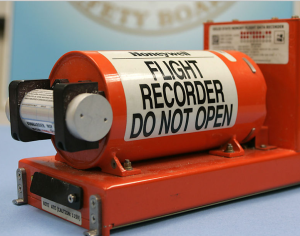Airlines: “Deployable Data Recorders Cost Too Much”
 As of this writing, the search for the AirAsia Flight QZ8501 ‘black boxes’ is now entering the third week. Searchers are homing in on these data recorders (see my recent blog post here) but the difficulties are reminiscent of the two-year search needed to find the data recorders for Air France Flight 447.
As of this writing, the search for the AirAsia Flight QZ8501 ‘black boxes’ is now entering the third week. Searchers are homing in on these data recorders (see my recent blog post here) but the difficulties are reminiscent of the two-year search needed to find the data recorders for Air France Flight 447.
A recent article by Reuters has highlighted the need for government regulation in the interest of public safety. Deployable or ‘ejectable’ data recorders were invented in the 1960s and have been installed in many military aircraft. They have not been installed on civil transport aircraft due, in part, to the increased cost over the conventional non-deployable recorders, but mainly due to the lack of government mandate.
Unlike on-demand video and WiFi, data recorders are not generally on the minds of customers purchasing tickets. As a result, airlines have chosen to bear the cost burden of installing in-flight entertainment systems but not deployable data recorders. Although conscientious businesses do exist, the history of capitalism is filled with stories of whining companies moaning that they cannot afford the costs associated with a particular effort aimed at improving health and safety.
As an example, legislation requiring coal mining companies to perform land reclamation after strip mining was strongly opposed due to cost concerns and was initially vetoed by President Ford before getting reintroduced and signed into law by President Carter (Surface Mining Control and Reclamation Act of 1977).
In my opinion, however, one of the most vivid examples of the need for government regulation to aid in health and safety occurred in the railroad industry in the late 1800s. It is estimated that during this time twenty to thirty thousand railroad men were maimed or killed every year due to hazardous working conditions. Specifically, although both automatic couplers and air brakes for trains had already been invented, the railroads did not implement them due to cost concerns. The public, in fact, seemed to blithely accept the notion that railroad work was inherently and unavoidably dangerous. A successful Iowa farmer by the name of Lorenzo Coffin was galvanized into action after personally witnessing a railroad worker lose two fingers in the act of coupling two railroad cars. Although the financial might of the railroad industry enabled them to influence and/or outright control many members of Congress, Coffin was relentless. His twenty-year advocacy effort ultimately led to the Railroad Safety Appliance Act being signed into law by President Benjamin Harrison in 1893. In the year following, casualties among trainmen dropped by 60%. More details can be found in an excellent article by Richard Snow in American Heritage here.
Although there is a long history of lobbying against health-and-safety legislation by deep-pocketed industries, there is also a long history of successful public advocacy. Oh, and it should be noted that, despite the dire predictions of befalling disaster, neither the railroad nor the coal mining industries went out of business after the aforementioned laws were enacted. If the appropriate federal or international governing body mandated deployable data recorders, the airlines would continue to stay in business. Yes, deployable data recorders cost more, but weeks (AirAsia), months (Malaysia Air MH370) or years (Air France 447) of searching is not free either.
